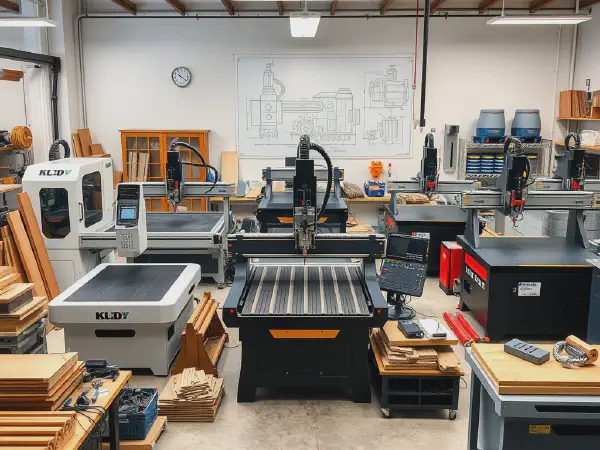Expert Guide on How to Choose CNC Machines for Businesses

CNC Machines for Small Businesses: Revolutionizing Manufacturing
CNC Machines for Small Businesses are transforming the landscape of manufacturing and production by providing automation, precision, and efficiency. These machines use Computer Numerical Control technology to automate the operation of tools, making them essential for small businesses looking to boost productivity and compete in the market.
The adoption of CNC Machines for Small Businesses allows entrepreneurs to take on complex projects that would have been time-consuming and labor-intensive with traditional methods. With their capability for detailed and repetitive tasks, businesses can achieve consistent quality in their products, leading to higher customer satisfaction and loyalty.
Moreover, CNC Machines for Small Businesses are becoming more accessible than ever. Various types and sizes of machines cater to different needs and budgets, empowering small enterprises to invest in technology that was previously reserved for large manufacturers. This democratization of manufacturing technology enables small businesses to innovate and grow, regardless of their size or the industry they operate in.
In this article, we will explore the different types of CNC machines available for small businesses, key features to consider when purchasing one, cost considerations, various applications in diverse sectors, and how to choose the right CNC machine for your specific needs.
CNC Machines for Small Businesses are not just an investment in equipment, but a step towards greater operational efficiency, competitiveness, and profitability.
Types of CNC Machines
Router CNC Machines are versatile tools that can cut and engrave a variety of materials including wood, plastics, and composites. They operate using rotating bits, providing high levels of precision in cutting intricate designs, making them suitable for industries such as sign making and custom furniture production.
Laser CNC Machines utilize focused laser beams to cut or engrave materials with exceptional accuracy. They are ideal for small businesses focused on promotional products and custom designs on materials like acrylic, wood, and metal. Laser machines are prized for their speed and the quality of finished products, making them a popular choice among graphic designers and artists.
Plasma CNC Machines are used primarily for cutting metal sheets. Using a high-temperature plasma torch, these machines can cut through various metals with high precision. They are essential for small manufacturing businesses involved in metal fabrication, automotive repair, and construction industries.
Milling CNC Machines, one of the most common types, can perform various tasks such as drilling, cutting, and shaping materials. They are used in diverse applications, ranging from prototypes to complex metal parts, making them invaluable to engineering companies and product developers.
3D Printers, an extension of CNC technology, create three-dimensional objects by adding layers of material based on digital models. These printers are gaining popularity in small businesses for prototyping, custom manufacturing, and even in sectors like healthcare for creating personalized medical devices.
Key Features to Consider
When investing in CNC Machines for Small Businesses, precision and accuracy are paramount. The capability to produce detailed results consistently can set a business apart from competitors and ensure customer satisfaction.
Ease of use and software compatibility are other crucial features. A user-friendly interface and integration with existing design software can save time and make operations smoother, especially for businesses with employees who are not CNC experts.
Size and workspace considerations cannot be overlooked. Small businesses must assess their available space to accommodate the machine while considering the workflow to optimize efficiency in production.
Speed and efficiency of the CNC machine can significantly impact the turnaround time for projects. Faster production can enhance profitability, so choosing a machine that balances speed with quality is vital.
Lastly, maintenance and support are essential. Reliable customer support from the manufacturer and ease of maintenance can minimize downtime and prolong the lifespan of the CNC machine, making them a more valuable investment in the long term.
Cost Considerations
Initial investment is often the first consideration for small businesses. CNC Machines vary significantly in price depending on their type and capabilities, so budgeting appropriately is essential to avoid financial strain.
Operating costs, including energy consumption, tooling, and maintenance, should also be factored in. Understanding these costs will help businesses gauge long-term financial viability and profitability from their CNC investments.
Financing options can be explored to ease the burden of initial investment. Many manufacturers offer financing plans, and some businesses may qualify for grants or loans aimed at fostering technological advancements.
Long-term value is an important consideration as well. Investing in a durable machine that meets evolving needs can yield significant returns over time, making it easier for a business to scale and adapt.
Resale value should not be overlooked, as certain models or brands maintain their value better than others. This aspect can provide businesses with a safety net should they decide to upgrade or change their equipment in the future.
Applications of CNC Machines in Small Businesses
Prototyping is one of the primary applications of CNC Machines for Small Businesses. They allow rapid development and iteration of designs, which is crucial in competitive markets where time to market is key.
Custom manufacturing is another important application, as businesses can tailor products to meet specific customer demands, enhancing customer relationships and generating additional revenue streams.
Sign making businesses benefit greatly from CNC technology, allowing them to create intricate and custom signs that stand out, thereby attracting more clients and expanding their service offerings.
In woodworking, CNC Machines enable craftsmen to achieve precision in cutting and engraving, opening up new design possibilities that were previously difficult or impossible to realize with traditional tools.
Metal fabrication businesses can use CNC Machines for tasks ranging from simple cuts to complex welds, improving efficiency and ensuring high-quality end products that meet industry standards.
Choosing the Right CNC Machine for Your Needs
Assessing your business requirements is the first step in choosing the right CNC machine. Consider the type of projects you undertake, the materials you work with, and the desired output quality.
Examining production volume is also vital. Understanding how much production is required will help in selecting a machine that can handle your desired output without overloading.
Evaluating material types is crucial since different CNC machines are compatible with various materials. Ensure that the machine you choose can effectively handle the primary materials you plan to work with.
Determining your skill level and the expertise of your staff can guide your choice in terms of complexity and ease of operation. A machine that matches your team's skills will maximize productivity and efficiency.
Finally, considering future expansion potential is essential. Investing in a CNC machine that can grow with your business ensures that you won't have to replace it as your needs evolve, saving time and money in the long run.
